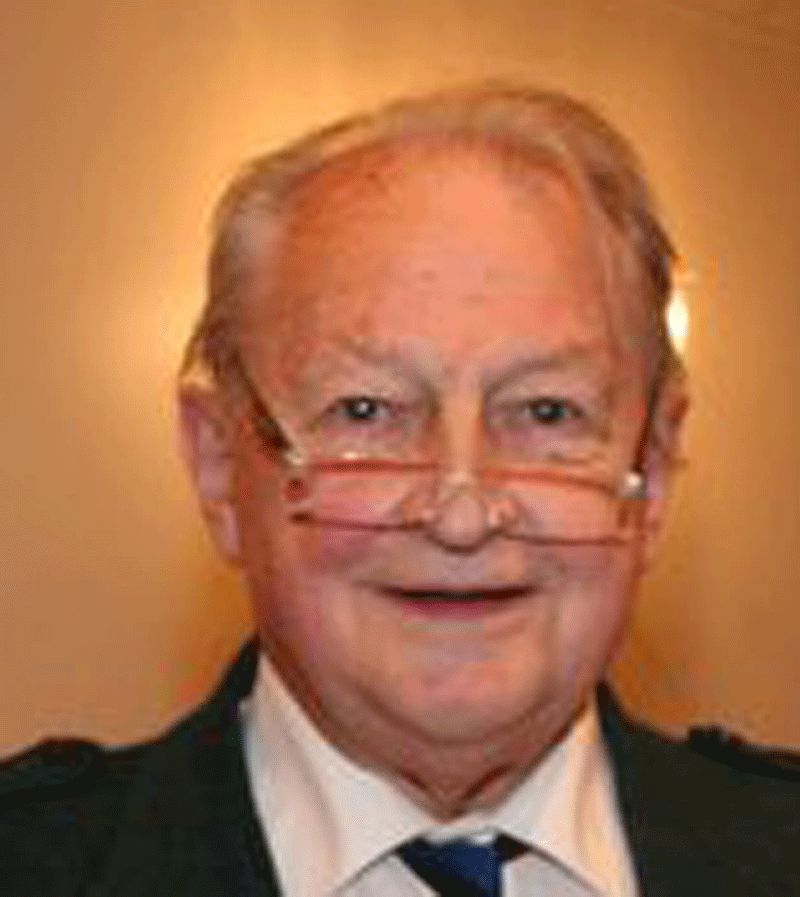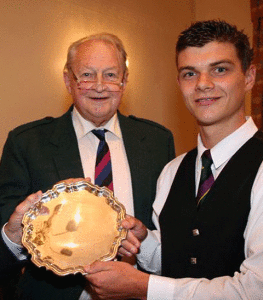 To complete his look at the work and history of the Highland Society of London, Angus Nicol relates the background to the MacGregor Memorial Piobaireachd Competition for young pipers, one of the most important such competitions in world piping. Angus is pictured above presenting the winners’ trophy to the 2013 recipient Sandy Cameron.
To complete his look at the work and history of the Highland Society of London, Angus Nicol relates the background to the MacGregor Memorial Piobaireachd Competition for young pipers, one of the most important such competitions in world piping. Angus is pictured above presenting the winners’ trophy to the 2013 recipient Sandy Cameron.
The competition was born out of the Falkirk Bicentenary piping competition held on 10th October 1981 by the Highland Society of London. The bicentenary was that of the first piping competition, which had been held by the Highland Society also in Falkirk on 12th October 1781, at a time when the Highlands were still suffering from the reprisals following the unfortunate end of the 1745 Rising.
The original piping competition was held for two reasons: first, because following the Disarming Act of 1746 there was a real danger that the art of playing the Great Highland Bagpipe might die out, with a serious loss of what is the classical music of the bagpipe created and developed over some centuries. The second reason was a political one. It was considered that such an event, almost in the teeth of the 1746 Act, would be a powerful weapon, if successful, in the hands of those who were striving for the repeal of that Act.
The Act forbade the wearing of the tartan, the carrying of arms, and tacitly the playing of the bagpipe in the Highlands; and Falkirk, lying more or less on what is known as the Highland Line, was chosen because it would be difficult to establish that they were being played in the Highlands. The competition was held during the Falkirk Tryst, when the town was crowded with visitors from the whole of Scotland, from Ireland, and even from the north of England. The competition itself was a great success and became an annual event. It was also a considerable success in the campaign for the repeal of the Act, which was achieved in the following year, 1782. The clan lands confiscated after the ‘Forty-five were restored in that and the following year.
Naill Pipe Chanter:
The Highland Society decided that so momentous an occasion should be commemorated after 200 years, and decided to hold a piping competition, also, if possible, in Falkirk, on a date as close to the bicentenary as possible. After several discussions and a meeting with Falkirk District Council, the Council generously invited the Society to hold the competition in the Falkirk Municipal Buildings. The Society then set about searching for the funds that would be necessary to pay for the running of the competition, prizes for competitors, and some assistance for those coming from far away.
While the search for funds was going on, the President of the Society, Lord Thurso, who was in the forefront of the quest for funding, received a telephone call from a Mrs. Audrey Jamieson. Mrs. Jamieson explained that she was the great-great-great-great-grandaughter of John MacGregor, who had been piper to Prince Charles Edward throughout the ‘Forty-five. He had also won third prize at Falkirk in 1781, his son Patrick winning the prize pipe for first prize. Mrs. Jamieson said that she had only just heard that the bicentenary competition was to be held, and offered a generous sum of money in support. This was most gratefully accepted for the Society by Lord Thurso.
After the competition was over, it was found that, thanks to other donors who had made donations of money and some in kind (such as enough whisky to satisfy the thirsty given by Matthew Gloag Ltd.), there was a surplus of funds, which was offered proportionately to each of the donors of money. Mrs. Jamieson refused to accept the return of any of her donation, and said that she would much rather that it should be used to encourage young pipers. That amount became the foundation of the funds necessary to begin and continue the MacGregor Memorial Piobaireachd competition, so-called in memory of that family which provided two of the prize-winners in 1781 and which dominated the prize lists for several decades thereafter, and from whom Mrs. Jamieson was descended.

After much thought, and advice sought from a number of the leading pipers of the day and some senior judges, it was decided that the new competition should reflect some of the attributes of the first Falkirk competition. Competitors were to be asked to play two tunes, and would be judged on both. Originally, would-be competitors were required to choose four tunes from the Silver Medal list for the year. That did not seem very popular, and when that condition was changed so that each competitor should submit four tunes of his or her own choice, the number of entrants increased considerably. The competition was confined to pipers who were under 22 years of age on the day of the competition. There was no lower age limit, and there have been prize-winners as young as 13 or 14 in the subsequent decades.
The original notion was that the competition should be held in two parts: the first would be at Oban during the Argyllshire Gathering, at which the entrants would play one of their submitted tunes. The second part was to take place in Inverness during the Northern Meeting piping competitions, before the same bench of judges as had heard the first tunes at Oban. That scheme lasted for three years, but after that the Piping Convenor of the Northern Meeting made it clear that the Northern Meeting did not wish the second leg to take place in Inverness. The Society regretted this, as the intention had been to involve both the competitions which were principally supported by the Society. However, after 1986 the MacGregor was held at Oban, being warmly welcomed by the Argyllshire Gathering. The MacGregor continues to be administered by the Society, and is not, technically, a part of the Argyllshire Gathering.
In early years the number of entrants was not high, and it was reasonably possible to hear two tunes from each competitor in the day. They were judged on both tunes, not only on the better of the two tunes played. The competition is, however, quite an attractive one for young pipers, the first prize carrying with it a bursary awarded for the purpose of assisting the first prize winner with the expenses of continuing his studies of ceòl mór. Consequently, the numbers grew considerably over the years, and it became impossible to hear both tunes from all entrants within the Wednesday of the Argyllshire Gathering. For some years, therefore, the names of all the entrants were submitted to an international committee of piping judges. The judges were chosen from those countries from which competitors customarily came to the Scottish competitions, and from which competitors for the MacGregor also came. This committee was invited to indicate which of the entrants its members considered were good enough to compete in a competition which was gradually gaining a reputation for its high standard. This scheme worked reasonably well, but it was with considerable regret that a number of able young pipers had to be told that they were only on the Reserve list.
MacCrimmon Piob
The next move was to increase the number of competitors and for the judges to decide upon six finalists each of whom would play a second tune. The finalists would still be judged on both tunes. This also worked reasonably well; but the numbers continued to grow until there was an unacceptably large list of reserves, most of whom would not be able to play. A further change in the scheme of things therefore had to be devised. From 2011 all entrants were divided into two heats, so that all who entered could play. A final, of four from each heat, decided upon by the judges, would then play a second tune in the final, before the judges of both heats, and the prize-winners chosen from that final.
It is certainly true that the standard of piobaireachd playing in the MacGregor competition has improved over the years. On more than one occasion the judges have expressed the opinion that the finalists, and particularly the first prize winner, would not have been out of place in the Gold Medal competition. It is certainly the case that in the last twenty years, at least, there have only been two really poor performances. And on a more positive note, one year, when a 17 or 18-year-old finalist played The Lament for Donald Duaghal MacKay,
In 2012 the then Principal of the College of Piping suggest they offer a trophy for the first prize winner. This was gratefully accepted by the Society, and in that year and thereafter a very handsome silver salver has been presented to the winner.
• The 2015 MacGregor Memorial Competition featuring some of the world’s top young professional pipers will be held on August 26 at Oban.



















